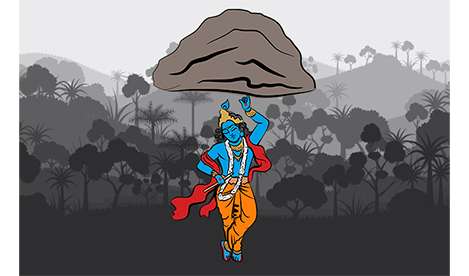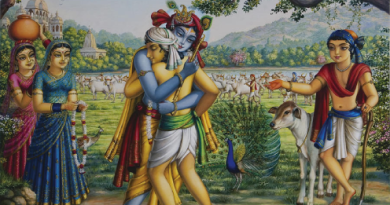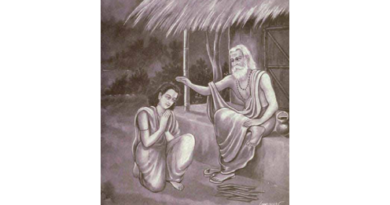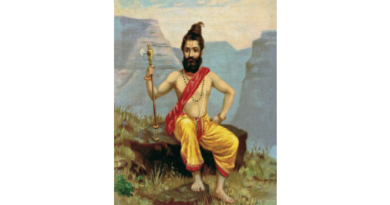HAND OF GOD
While we often believe that the acts of success are all purely based on our actions, we fail to acknowledge that we are equally responsible for the act of failure. That’s not entirely undesirable, though, for the moment we realize this, we become equal to God or perhaps even God. The Lord said, “Keep my devotees happy so that I can keep you happy,” knowing too well. If you read the Bhagavata, you will gradually come to understand that, although being the story of God, the narration starts by emphasizing the significance of his followers. The most prominent illustration of this would be Hanuman; a temple dedicated to Hanuman can exist independently of Rama, yet a temple dedicated to Rama cannot exist without Hanuman.
But, how does he choose his devotees? That has always remained a mystery. But what’s not a mystery is you choose him over all else.
Life is a mysterious cycle, partly planned I can say, but most of the time, the unexpected becomes the expected. In the direst times, I have often felt the hand of God in action. I am sure most believers would agree with me, for a few, the acknowledgment will take some more time. ‘What is that hand of God?’ I have wondered and today I finally found the answer.
The heavens operate similarly to corporate job descriptions and office resumes. According to Indra’s job description, he is the King of Heaven; Vayu is responsible for the air; Surya provides light; and so on. Even though they have been given certain roles, the heavens require them to carry them out without fail because any disarray might seriously impair the system’s ability to function as a whole. The inhabitants of Brindavan had a custom whereby they worshipped Indra annually in exchange for prosperity and good rains on their land. Such worship has been practiced since the beginning of time, nearly becoming a cultural belief. Who would say no to a herd of people offering their fears as respects? Indra too lavishly accommodated their needs.
Every time absurdity hits its pinnacle, a revolution occurs. And it was none other than Krishna who started this uprising. He initially went to his parents and said, “Why do you seek a mediator in them when the supreme himself is ready to accept your pleas?” implying that Narayana is the one in charge of the entire order of creation. Despite the fact that Nanda thought the advice sounded good, he was too terrified to accept it. Krishna, however, was unflinching and organized his friends to launch a rebellion at Govardhan Parvath’s foothills.
He said that Govardhan’s existence shielded the whole of Brindavan from natural disasters. He went on to say that the people had roots and fruits from him and that the animals and birds had taken refuge beneath him. He holds the true possession of their prayers, as Narayana is inside him. The villagers were deceived by Krishna’s awe-inspiring gaze, and his presence caused them to see Narayana’s presence atop the hill.
The people’s views turned wiser, and they directed their prayers toward Govardhan Parvath. However, the unexpected turn of events plunged Brindavan into anarchy. When Indra heard about the incident, he became upset and furious at the way people had behaved. He gave his enormous cloud, Samvardaka, orders to cause rain and floods, which would make the people miserable. As people started to realize that they had made a mistake by listening to the young Krishna, they also started making accusations against his father, Nanda, by word. Krishna, meanwhile, was positive and upset that Indra had unleashed such a torrent on his people, whom he held in the highest regard. The appropriate lesson for people in positions of authority turned into a pressing necessity.
Krishna raised Govardhan and danced in the Tribhangi manner, holding him in his little finger while casting a kind glance at him. His faithful friends were the first to trust him and proceeded directly beneath Govardhan’s protection, while the other villagers gazed on in wonder. They were too familiar with Krishna to believe that he would never throw the hill at them. He seems to have held it rather easily. Encouraging themselves to have faith in the little Krishna, the entire town moved beneath the hill, which now functioned as a protective cover from Indra’s fury.
I assume you can predict the remainder of the story. Throughout all of the Yugas, human mind remains constant. The largest issue is always one of trust because, even when it comes to God, we frequently don’t give it our all. The local elders obtained wooden logs and arranged them in the shape of pillars, seemingly to support Krishna while he held the Parvath. The gods of Heaven had grown even more enraged, which meant more trouble. However, nothing in the world can defy Krishna’s commands. After a few days, Indra understood what he was up against and marched down to Brindavan himself, only to run into further difficulties.
The sun shined brightly, the rains had ceased and the tragedy had abruptly stopped, and Brindavan appeared to be back in action. Observing from a far corner, Indra became aware of his arrogance. The whole community watched as the hill nearly collapsed, crushing the logs, after the locals suggested that their logs acted as sturdy pillars and that Krishna might now remove his finger. Krishna did so slowly and with an innocent smile. Once more, Krishna had to restrain Govardhan. The locals left in humiliation, realizing that their pillars provided no foundation for assistance.
This is God’s hand, is it not? Sometimes, even in the face of complete failure, there remains some silver lining that keeps us from sinking. Our little finger hardly serves any use at all, but if it is God’s, then grasp it carefully. There’s a thread of hope left.
Krishna simply had one thing to say to Indra: “Power should not be accompanied by arrogance but by responsibility.”
ANITHA CHAKRAVARTHY SRIRAM





Hare krsna ..Very nice.keep rocking